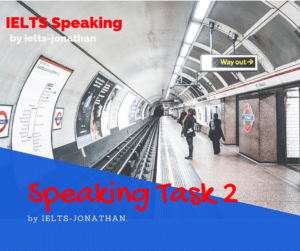Did you know that the second part of the IELTS Speaking test can be the most difficult for candidates, even Native Speakers.
But don’t despair it can also be the easiest part, and the most enjoyable.
There is a valid reason for this part of the IELTS test, and I will explain this below.
One reason for Part 2 is to allow the candidate speak at length and meet the fluency criteria.
A second reason is to allow the examiner to grade your ability for the follow up questions in Part 3.
They are trained to listen carefully for language range, grammar accuracy and pronunciation is normal speech.
They can then chose the best question sets in Part 3 that allows you to display your real language ability. So it’s important to fill that 2 minutes the best you can.
Part 2 Structure
You are given a set of prompts and a question.
The prompts are not particularly challenging, but follow a pattern to give you ‘ideas’ and ‘structure’ for your 2 minute talk.
This gives the examiner ‘a further opinion‘ to your level, ready for Part 3.
One way to do well in this section is to try and relax.
A relaxed candidate always performs better and responds well.
If you don’t understand something, always ask the examiner to repeat the prompt question.
The examiner can’t help you directly, but repetition might help you understand the prompt better.
Other tips are
- Don’t give the examiner an opportunity to ask ‘can you say anything else about that’.
- Speak for the full 2 minutes until the examiner stops you.
- Don’t hesitate too much, you are allowed to make some mistakes, it’s natural.
- Connect your sentences and use the structure given in the prompt.
- Attempt to use complex sentences rather than short, simply ones.
and
- Don’t be afraid to correct yourself.
What if you really don’t understand the prompt or even worse the prompt doesn’t apply to you?
If you’re preparing for IELTS, and feel you cannot answer some of the speaking questions properly, simply because they really do not apply to your current life experience, then don’t worry as you’re not alone.
For example:
Q. Talk about an object you own that is especially valuable or important to you.
Problem: I have a quite spartan lifestyle and I don’t have any emotional attachment to any objects I own.
Q. Talk about an object that has had great influence in your life, and explain how it influenced your life.
Problem: While I could talk for hours about books that I love, I don’t really feel that there is a book that has truly influenced my life.
IELTS Speaking Topic: Waiting for someone
Describe an occasion when you waited for someone.
You should say:
who you waited for
when you waited for the person
where you waited for the person
and explain why you waited for the person.
I’m going to talk about an occasion I had to wait for a colleague at the airport.
This happened in April. I was taking a business trip with a colleague from Norwich airport to Amsterdam. That morning, I made sure I woke up early because I had to drive about 15 miles to get to the airport. Everything was going smoothly, there was little traffic and I found a parking space easily. I only had hand luggage so I took a seat in the airport bar where we agreed to meet and waited. One hour soon passed, but the colleague didn’t show up.
By now, I was beginning to worry a bit, thinking that the business trip had been cancelled or my colleague had over-slept. I tried to make a telephone call to him, but could not get through.
So I made a decision that if the flight was still available, then I would still go. Just at the last minute, and to my surprise, I saw the person I was waiting for enter the boarding gate, slowly and relaxed.
I was quite angry about this situation, so I asked him why he’d come to the airport so late. His reply was that he’d never hurried to catch the airplane before, and said I should relax and take it easy.
I suppose this illustrates the different cultural attitudes towards punctuality and maybe I’d arrived too early.
Solution to this problem
IELTS is a test of your language ability, not intelligence or knowledge.
You may think the IELTS test is an interrogation, but you don’t really need to answer with the truth.
However, I would feel more comfortable with the be honest approach, even if it does not directly answer the question.
You would probably be able to answer more naturally, and therefore be more fluent.
Which one do you think is a better strategy?
You can use tips and information on this website to help make it easier to obtain a higher score, but remember you still need to work at learning the language to be successful.
Please share to someone you know and in the meantime take a look at my Facebook Page and Website for IELTS answers and you can also join my Facebook Group here too.
Good Luck
Jonathan
I’m Jonathan I’ve taught IELTS and University English in more than a dozen universities and schools around the world. I’m a parent, traveller and passionate about language teaching and helping students achieve their dreams. Whilst living in Austria or working in Asia, I run IELTS courses to help students get to where they want to be. If you are serious about IELTS, connect with me to see how I can help you.



